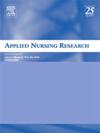影响医疗保健专业人员数字健康能力的因素:一项横断面研究
IF 2.7
4区 医学
Q1 NURSING
引用次数: 0
摘要
提高医疗保健专业人员的数字健康能力对于提供更安全的护理至关重要。然而,尽管在推动全球医疗保健数字化方面进行了大量投资,但仍缺乏探索影响医疗保健专业人员数字健康能力的因素的实证研究。目的本研究旨在找出影响医疗保健专业人员数字健康能力的关键特征。方法通过在线和纸质调查,使用两种工具收集了252名医疗保健专业人员的横断面数据,以测量2024年的数字健康能力以及相关的教育和组织因素。采用单变量和二元逻辑回归分析来确定影响数字健康能力的关键特征。结果较高的教育水平、在医院工作、更多的专业经验以及在工作或空闲时间更多地使用数字解决方案与较高的数字健康能力相关。更高的学历与更强的数字健康能力有关,涉及多个因素,研究生学位提高了与健康相关的咨询能力,本科学位提高了与工作相关的态度和评估数字解决方案。具有大学学历的专业人员和在医院工作的专业人员显示出更高的信息通信技术能力,而更多年的专业经验提高了使用数字解决方案的道德能力。结论数字化卫生能力发展应优先考虑低学历卫生保健人员。此外,此类举措应包括支持那些在非医院环境中工作、专业经验较少、在工作或空闲时间较少使用数字解决方案的人员。专业经验增加了使用数字解决方案的道德能力。持续的专业发展干预措施和组织政策应考虑这些因素,以提高医疗保健专业人员的数字健康能力。本文章由计算机程序翻译,如有差异,请以英文原文为准。
Factors influencing digital health competence among healthcare professionals: A cross-sectional study
Background
Improving healthcare professionals' digital health competence is critical to providing safer care. However, there is still a lack of empirical studies exploring the factors influencing healthcare professionals' digital health competence, even though significant investments have been made to advance digitalisation of healthcare globally.
Aim
This study aimed to identify the key characteristics influencing healthcare professionals' digital health competence.
Methods
Cross-sectional data was collected from 252 healthcare professionals using two instruments measuring the digital health competences and the associated educational and organisational factors in 2024 via an online and paper-based survey. Univariate and binary logistic regression analyses were performed to identify the key characteristics influencing digital health competence.
Results
Higher levels of education, working in a hospital, more professional experience, and increased use of digital solutions at work or during free time were associated with higher digital health competence. Higher qualifications were linked to greater digital health competence across several factors, with postgraduate degrees increasing health-related counselling competence and undergraduate degrees enhancing work-related attitudes and evaluating digital solutions. Professionals with university qualifications and those working in hospital settings showed higher ICT competence, while more years of professional experience increased ethical competence in using digital solutions.
Conclusions
Digital health competence development should prioritise healthcare professionals with lower educational levels. Additionally, such initiatives should include supporting those who work in non-hospital settings, have less professional experience, and use digital solutions less frequently at work or in their free time. Professional experience increases ethical competence in using digital solutions. Continuous professional development interventions and organisational policies should consider these factors to improve healthcare professionals' digital health competences.
求助全文
通过发布文献求助,成功后即可免费获取论文全文。
去求助
来源期刊

Applied Nursing Research
医学-护理
CiteScore
4.50
自引率
0.00%
发文量
65
审稿时长
70 days
期刊介绍:
Applied Nursing Research presents original, peer-reviewed research findings clearly and directly for clinical applications in all nursing specialties. Regular features include "Ask the Experts," research briefs, clinical methods, book reviews, news and announcements, and an editorial section. Applied Nursing Research covers such areas as pain management, patient education, discharge planning, nursing diagnosis, job stress in nursing, nursing influence on length of hospital stay, and nurse/physician collaboration.
 求助内容:
求助内容: 应助结果提醒方式:
应助结果提醒方式:


